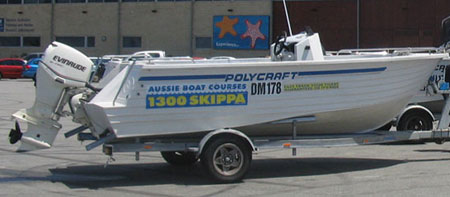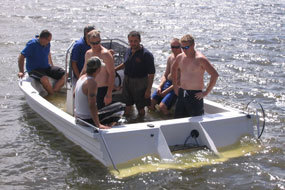There is alot of confusion out in the market at the moment about the RST and the price differences, after all they are the same ticket aren’t they?
To simplify and help people understand what they are getting for their money we have compiled a list of 4 questions you should ask before booking your ticket, after all you only have to do it once so you only get one chance to get it right.
1. Who is going to be your trainer/assessor on the day and what experience and qualifications do they have?
We have been successfully training novice mariners in WA Recreational Skippers Tickets for over 10 years in a full time capacity, training over 10,000 WA mariners, no one else can say that. Let’s hope after that experience we know what we are doing by now.
As far as the Department of Transport requirements are assessors only need to be a restricted Coxswain, this is a 2 day course (12 hours of theory and 6 hours of practical). Put this together with a minimum of 6 months sea time and you have the marine qualifications necessary to train and assess the RST.
We only have 3 assessors and 3 boats so we are by no means the biggest operator out there but all 3 of our trainers are Master Mariners. This means that they have to have a minimum of 36 months sea time which takes at least 5 years before they can even do their exams. This means our assessors have spent a good deal of their lives making a living on the water which is why we are called Masters.
2. What vessel is going to be used for the training and assessing?
Any registered boat can be used in WA for the RST, this is obviously a vast range from rubber ducky’s where your backside is touching the water to a 75 footer.
Our boats are built to survey requirements which means they must meet special much stricter government requirements to do with stability, flotation and general safety.
Our boats are made from polyethylene which naturally floats but is also very heavy and strong making them very stable even in the roughest of conditions (popular with abalone divers in the Southern Ocean).

We obviously don’t go in rough weather for the RST but when someone moves or the sea breeze is in our boats keep going straight while aluminium will generally roll a little or get blown sideways as too light.

Our Boats model undergoing Swamp Test necessary for Survey. This is not part of the Skippers Ticket Course but shows the superiority of our boats as a training vessel
I have seen other trainers on little dinghys with 4 people on them with their knees up under their chins that I would not let my kids go on unless I thought they could swim to shore. Our training vessels cost $40,000 each and upwards as we believe the on the water training is the most valuable time we spend with you.
We can sit 5 comfortably so you can also enjoy the experience without being too stressed and uncomfortable although 4 is usually a full class.
3. How much training is involved?
To pass your RST theory you must get 34 out of 40 as a minimum. Fairly simple to achieve with a bit of reading but if after 2 months you have forgotten what that marker is with 2 black balls on top your boating enjoyment will be jeopardised somewhat and the RST did not give you what it should of (knowledge and a skill set not just another bit of plastic).
We have over 10 years (since 2006) trained over 10,000 skippers, we understand the skippers ticket and how to get you to understand it better than anyone else. We are not Rhodes scholars, our job is to get you to remember valuable boating information like collision regulations, IALA buoyage system, safety gear and their practical use to name a few.
A lot of other trainers are on a park bench or in the dinghy with papers blowing everywhere with no training other than self study, good luck. Sure you might pass after 1 or more attempts but the majority of people will not retain information for long this way unfortunately and it will cost you more in the long term, hopefully only in money.
We do not want to bore you to death over 2 days in a classroom. Our most popular course has a 1 hour theory training session that focuses solely on the technical side and how to turn it into information you get. We expect you to already have the common sense and 70% of boating is common sense, we focus on the 30%.
4. How much is it going to cost me?
We have heard prices ranging from $80 to $350 and everything in between. At the end of the day you need to ask “what do I get for my money?”.
We will start at the bottom end around the $40 for a theory test. There is way too much information in the workbook for most people to remember.
We have already talked about the theory training as far as getting decent knowledge you can remember over time. The practical we believe is nearly impossible if assessed correctly without prior training and it has nothing about boat handling ability but everything about recalling all the essential criteria of which there are 64.
There are 11 tasks all with their own criteria, quite a few have between 7 and 9 seperate criteria depending on which vessel you are training on. Assessment only means just that no training so you can only miss 6 criteria in the whole practical (out of 64).fail the task, not easy when someone says “OK test time please log on for your voyage”, this has 8 criteria, GOOD LUCK.
We have been asked in the past to do practical assessment only and we say yes no problem but you have a 1% chance of passing simply because the brain cannot remember 64 things without our training.
We would do practical assessments for $100 even on our boats but we will not promote it because there will be alot of unhappy people if assessed correctly as we obviously must.
The top end of the price bracket offers a more in depth course usually running over a couple of days, so they should cost more. At the end of the day it comes down to how much knowledge will you utilise on the water and that is up to you.
Book Your RST Ticket With Aussie Boat Courses NOW!
We believe these are the 4 points that will dictate which assessor you use and how much you pay.
At least with asking the above questions you can make an informed decision without just going on price. You only have to do the RST once, be careful who you choose and what you get for your money.
Getting the RST successfully at the cheapest price is one thing but when you are on the water on your own it is the confidence you can easily acquire from doing it that really matters, being legal does not always equate to being confidant.
If you have any questions, please feel free to call us on 0488 188 817



